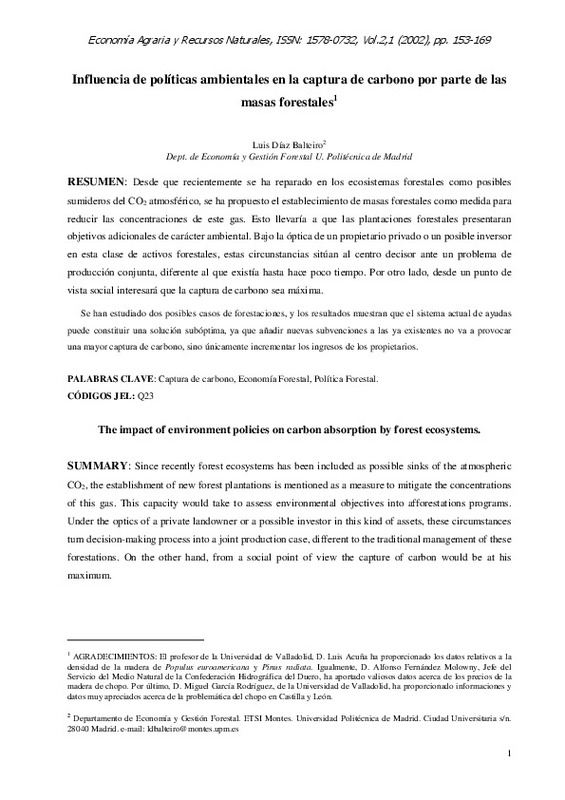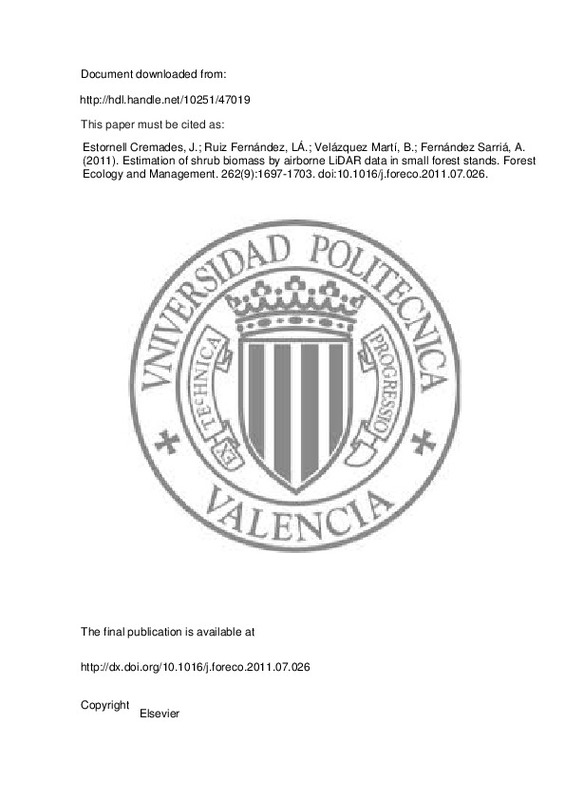JavaScript is disabled for your browser. Some features of this site may not work without it.
Buscar en RiuNet
Listar
Mi cuenta
Estadísticas
Ayuda RiuNet
Admin. UPV
The impact of environment policies on carbon absorption by forest ecosystems
Mostrar el registro sencillo del ítem
Ficheros en el ítem
| dc.contributor.author | Díaz Balteiro, Luis
|
es_ES |
| dc.date.accessioned | 2018-10-08T10:37:24Z | |
| dc.date.available | 2018-10-08T10:37:24Z | |
| dc.date.issued | 2002 | |
| dc.identifier.issn | 1578-0732 | |
| dc.identifier.uri | http://hdl.handle.net/10251/109897 | |
| dc.description.abstract | [EN] Since recently forest ecosystems has been included as possible sinks of the atmospheric CO2, the establishment of new forest plantations is mentioned as a measure to mitigate the concentrations of this gas. This capacity would take to assess environmental objectives into afforestations programs. Under the optics of a private landowner or a possible investor in this kind of assets, these circumstances turn decision-making process into a joint production case, different to the traditional management of these forestations. On the other hand, from a social point of view the capture of carbon would be at his maximum. Two possible cases of afforestations have been discussed, and the results show that the current system of European grants cannot constitute an optimal solution, since to add new grants to those existent it won't cause bigger carbon storage, but only an increase in the landowners’ revenues. | es_ES |
| dc.description.abstract | [ES] Desde que recientemente se ha reparado en los ecosistemas forestales como posibles sumideros del CO2 atmosférico, se ha propuesto el establecimiento de masas forestales como medida para reducir las concentraciones de este gas. Esto llevaría a que las plantaciones forestales presentaran objetivos adicionales de carácter ambiental. Bajo la óptica de un propietario privado o un posible inversor en esta clase de activos forestales, estas circunstancias sitúan al centro decisor ante un problema de producción conjunta, diferente al que existía hasta hace poco tiempo. Por otro lado, desde un punto de vista social interesará que la captura de carbono sea máxima. Se han estudiado dos posibles casos de forestaciones, y los resultados muestran que el sistema actual de ayudas puede constituir una solución subóptima, ya que añadir nuevas subvenciones a las ya existentes no va a provocar una mayor captura de carbono, sino únicamente incrementar los ingresos de los propietarios. | es_ES |
| dc.language | Español | es_ES |
| dc.publisher | Universitat Politècnica de València | |
| dc.relation.ispartof | Economía Agraria y Recursos Naturales - Agricultural and Resource Economics | |
| dc.rights | Reserva de todos los derechos | es_ES |
| dc.subject | Captura de carbono | es_ES |
| dc.subject | Economía Forestal | es_ES |
| dc.subject | Política Forestal | es_ES |
| dc.subject | Carbon sequestration | es_ES |
| dc.subject | Forest Economics | es_ES |
| dc.subject | Forest Policy | es_ES |
| dc.title | The impact of environment policies on carbon absorption by forest ecosystems | es_ES |
| dc.title.alternative | Influencia de políticas ambientales en la captura de carbono por parte de las masas forestales | es_ES |
| dc.type | Artículo | es_ES |
| dc.date.updated | 2018-10-08T08:14:52Z | |
| dc.identifier.doi | 10.7201/earn.2002.01.08 | |
| dc.rights.accessRights | Abierto | es_ES |
| dc.description.bibliographicCitation | Díaz Balteiro, L. (2002). The impact of environment policies on carbon absorption by forest ecosystems. Economía Agraria y Recursos Naturales - Agricultural and Resource Economics. 2(1):153-169. https://doi.org/10.7201/earn.2002.01.08 | es_ES |
| dc.description.accrualMethod | SWORD | es_ES |
| dc.relation.publisherversion | https://doi.org/10.7201/earn.2002.01.08 | es_ES |
| dc.description.upvformatpinicio | 153 | es_ES |
| dc.description.upvformatpfin | 169 | es_ES |
| dc.type.version | info:eu-repo/semantics/publishedVersion | es_ES |
| dc.description.volume | 2 | |
| dc.description.issue | 1 | |
| dc.identifier.eissn | 2174-7350 |











